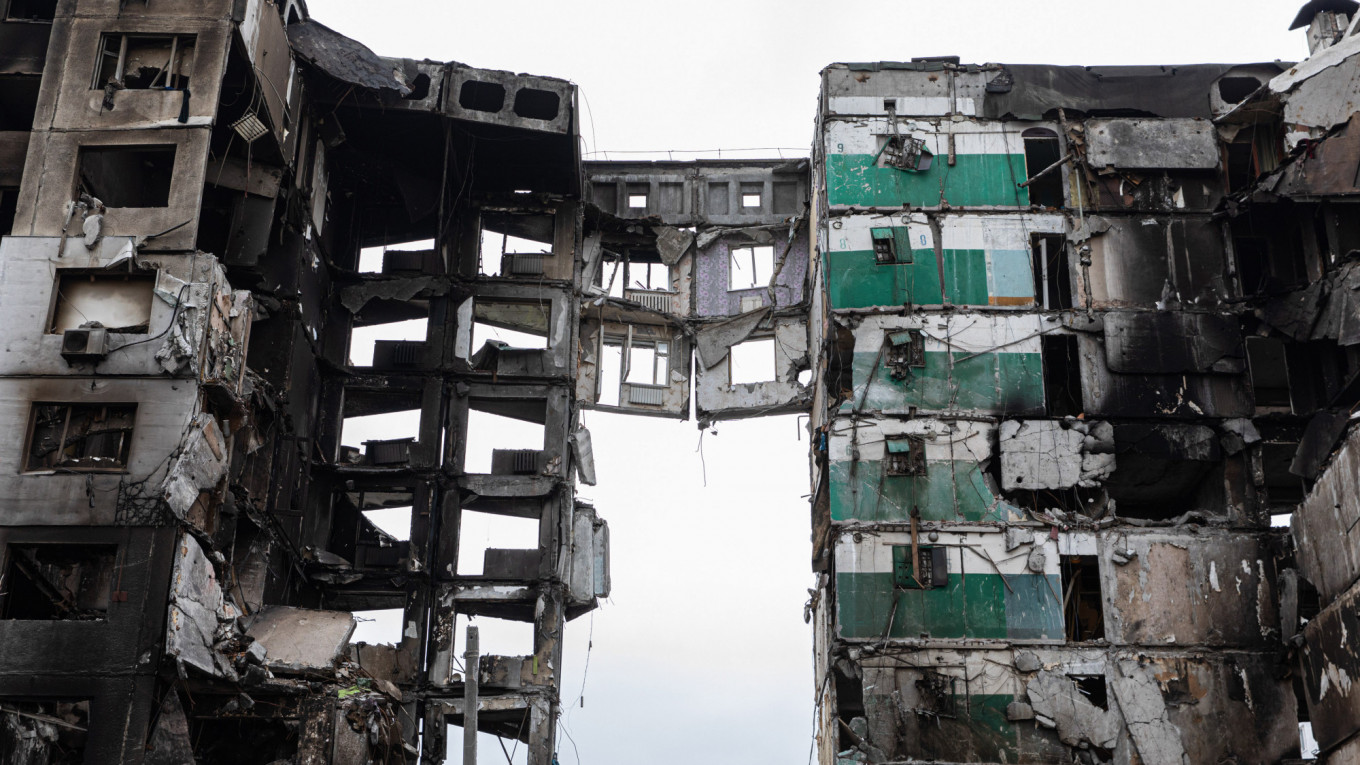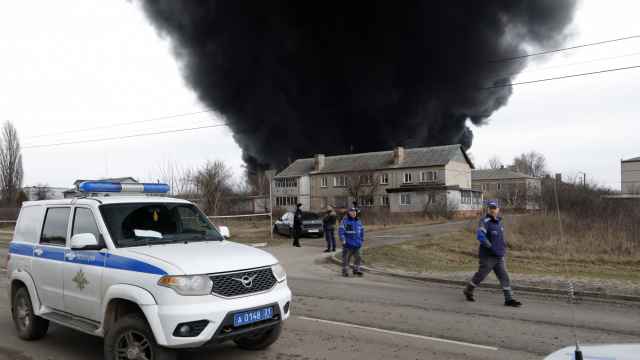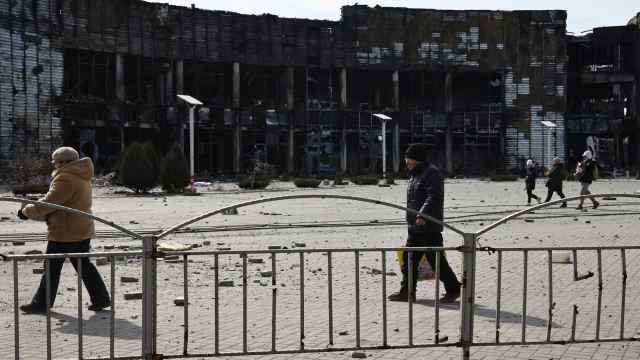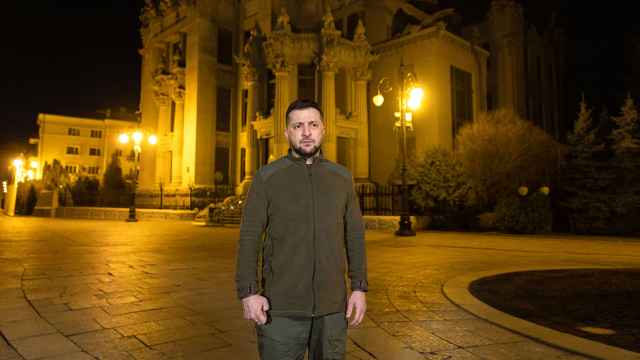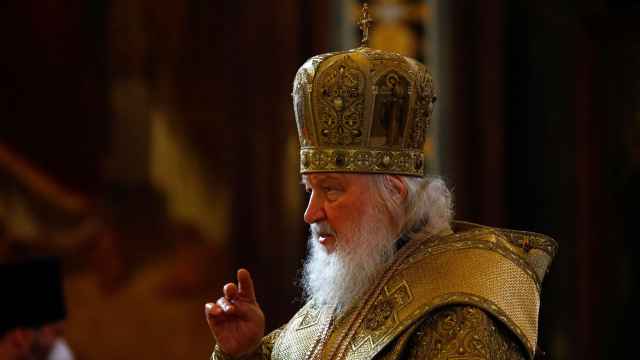Civilians in eastern Ukraine struggled to evacuate Friday as Russia redirects its firepower, with President Volodymyr Zelensky warning of "even more horrific" devastation being uncovered around the capital.
Ukrainian allies tightened the screws on Moscow further in response to shocking images from Bucha and other regions around Kyiv, with the European Union announcing an embargo on Russian coal and a ban on Russian vessels at its ports.
And at the United Nations, the General Assembly voted to suspend Russia from the Human Rights Council, only the second-ever suspension of a country from the body.
"Russia's lies are no match for the undeniable evidence of what is happening in Ukraine," U.S. President Joe Biden said, calling Russia's actions in the country "an outrage to our common humanity."
More than a month into President Vladimir Putin's invasion of Ukraine, Moscow has shifted its focus after stiff resistance put paid to hopes of an easy capture of the country.
Instead, troops are being redeployed toward the east and south, aiming to create a long-sought land link between occupied Crimea and the Moscow-backed separatist statelets of Donetsk and Luhansk in Donbas.
Heavy shelling has already begun to lay waste to towns in the region, and officials have begged civilians to flee, but the intensity of fighting is starting to hamper evacuations.
Luhansk governor Sergiy Gaiday said Russian shelling had damaged a railway route being used by evacuees in the town of Schastia, north of Luhansk.
"The railway was damaged. Train evacuation is in question. Thousands of people are still in the cities of Luhansk region," he wrote on Facebook.
And in Donetsk, the head of the regional military administration Pavlo Kyrylenko said three evacuation trains had been temporarily blocked after a Russian airstrike on an overpass by a station.
But officials continued to press civilians to leave where possible.
"There is no secret — the battle for Donbas will be decisive. What we have already experienced, all this horror, it can multiply," warned Gaiday.
"Leave! The next few days are the last chances. Buses will be waiting for you in the morning," he added.
'I want to escape this hell'
A barrage of shells and rockets was already hammering the industrial hub Severodonetsk, the easternmost city held by Ukrainian forces in Donbas, leaving buildings engulfed in flames.
"Every day it's worse and worse. They're raining down on us from everywhere. We cannot take it anymore," said Denis, a man in his forties with a pale, emaciated face.
"I want to escape this hell."
Around the capital meanwhile, residents and Ukrainian officials returning after the Russian redeployment are trying to piece together the scale of the devastation.
Violence in the town of Bucha, where authorities say hundreds were killed — including some found with their hands bound — has become a byword for allegations of brutality inflicted under Russian occupation.
But Zelensky warned worse was being uncovered.
"They have started sorting through the ruins in Borodianka," northwest of Kyiv, he said in his nightly address.
"It's much more horrific there, there are even more victims of Russian occupiers."
Violence in the area has caused massive destruction, leveling and damaging many buildings, and bodies are only now being retrieved.
Ukraine's Prosecutor General Iryna Venediktova said Thursday that 26 bodies had been recovered from two destroyed apartment buildings so far.
"Only the civilian population was targeted: there is no military site here," she said, describing evidence of war crimes "at every turn."
Fresh allegations emerged from other areas too, with villagers in Obukhovychi, northwest of Kyiv, telling AFP they were used as human shields.
And in besieged Mariupol, even the pro-Russian official designated "mayor" of the destroyed city acknowledged that around 5,000 civilians had been killed there.
'Help us now'
Moscow has denied targeting civilians in areas under its control, but growing evidence of atrocities has galvanized Ukraine's allies to pile on more pressure.
On Thursday, the EU approved an embargo on Russian coal and the closing of its ports to Russian vessels as part of a "very substantial" new round of sanctions that also includes an export ban and new measures against Russian bans.
In addition, it backed a proposal to boost its funding of arms supplies to Ukraine by 500 million euros, taking it to a total of 1.5 billion euros.
The Group of Seven industrialised nations also agreed more sanctions, including a ban on new investments in key sectors and fresh export restrictions, as well as the phasing out of Russian coal.
At the United Nations, 93 of the General Assembly's 193 members voted to suspend Russia from the body's rights council over its actions in Ukraine.
Russia blasted the move as "illegal and politically motivated," while Biden said it confirmed Moscow as an "international pariah."
Ukraine has welcomed new measures on Moscow, as well as the UN suspension, but it continues to push for more support.
"Ukraine needs weapons that will allow us to win on the battlefield, and this will be the strongest sanction," Zelensky said in his address, echoing calls from his foreign minister, who earlier asked NATO for heavy weaponry, including air defense systems, artillery, armored vehicles and jets.
"Either you help us now — and I'm speaking about days, not weeks — or your help will come too late, and many people will die, many civilians will lose their homes, many villages will be destroyed," Dmytro Kuleba said after meeting NATO foreign ministers in Brussels.
In a show of support, European Commission President Ursula von der Leyen will travel to Kyiv on Friday with the bloc's diplomatic chief Josep Borrell for talks with Zelensky.
The prospects for peace talks meanwhile appeared to fade further as Russia accused Ukraine of shifting its position from earlier discussions in Istanbul.
Ukrainian presidential adviser Mykhaylo Podolyak meanwhile warned Moscow to "lower the degree of hostility" if it was interested in peace.
A Message from The Moscow Times:
Dear readers,
We are facing unprecedented challenges. Russia's Prosecutor General's Office has designated The Moscow Times as an "undesirable" organization, criminalizing our work and putting our staff at risk of prosecution. This follows our earlier unjust labeling as a "foreign agent."
These actions are direct attempts to silence independent journalism in Russia. The authorities claim our work "discredits the decisions of the Russian leadership." We see things differently: we strive to provide accurate, unbiased reporting on Russia.
We, the journalists of The Moscow Times, refuse to be silenced. But to continue our work, we need your help.
Your support, no matter how small, makes a world of difference. If you can, please support us monthly starting from just $2. It's quick to set up, and every contribution makes a significant impact.
By supporting The Moscow Times, you're defending open, independent journalism in the face of repression. Thank you for standing with us.
Remind me later.


